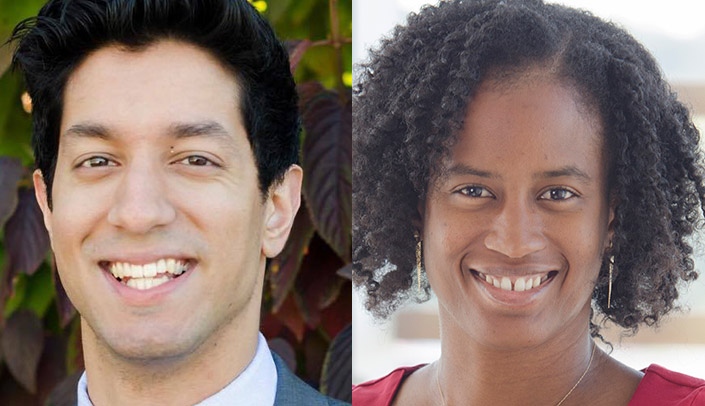As part of UNMC’s ongoing commitment to ensure students have the tools to care for patients from a wide range of backgrounds, first-year medical students are learning about the root causes of health inequities.
A $3,000 pilot grant funded by the UNMC College of Medicine in 2019 is the impetus for a new addition to the curriculum: "Structural Challenges & Inequities in Healthcare Delivery," which includes lectures and discussions focused on social and structural determinants of health, unconscious bias and microaggressions, and racism in medicine.
First-year medical students also spend a half-day in the Highlander neighborhood in North Omaha, where they engage with community leaders in housing, education, policy, health outreach and other areas.
The pilot was developed to complement and expand existing components of the curriculum focused on Health Systems Science, which were established by Kelly Caverzagie, MD, and others, said Jasmine Marcelin, MD, assistant professor of infectious diseases and associate director of the UNMC internal medicine residency program.
"We created an experience in the community where students can learn from community members’ firsthand experiences," she said. "This pilot curriculum demonstrates that teaching medical students about the impact of structural forces on health outcomes in a locally centered and community-participatory manner is both feasible and reciprocally beneficial. It also gives our community members a seat at the table in shaping how future physicians of Nebraska learn about social and health inequities in Omaha."
The curriculum is based on two main frameworks:
- Structural competency, which focuses on fostering an understanding of the intersections between race, class, clinical presentation and systemic root causes of health inequity; and
- Community-engaged teaching, which focuses on centering the strengths of the community, sharing power in a reciprocal way with community partners and amplifying the lived experiences of individuals from marginalized groups.
Dr. Marcelin and Rohan Khazanchi, a fourth-year UNMC medical student who co-led the project, and others from the medical center, recently published a paper in The Clinical Teacher that describes the development and evaluation of the curriculum.
"Our findings highlight a crucial role for community voices in curricula which aim to promote understanding of historic structural inequities and present-day health disparities," Khazanchi said. "We hope every student makes fighting health inequity part of their professional mission — and we recognize there is always more work to be done in educating ourselves on these issues."
The curriculum was created by a multidisciplinary advisory group of 11 UNMC and Nebraska Medicine clinicians, staff and administrators. The community engagement day was co-created and facilitated by 18 community partners ranging from business owners to leaders in education, health promotion, faith-based organizations and public housing. Community partners included the Omaha Housing Authority, Big Mama’s Kitchen, the Empowerment Network, Charles Drew Health Center, Nebraska AIDS Project, Omaha Public Schools, Kingdom Builders Church and the Center for Holistic Development.

Great project, Dr. Marcelin, Rohan, and team! Thanks for leading in this important work.
This is wonderful! Such a necessary addition to the curriculum. Hopefully there will be opportunities to expand.
Excellent work! I would love to see this model integrated into other UNMC programs as well.
Great teamwork!